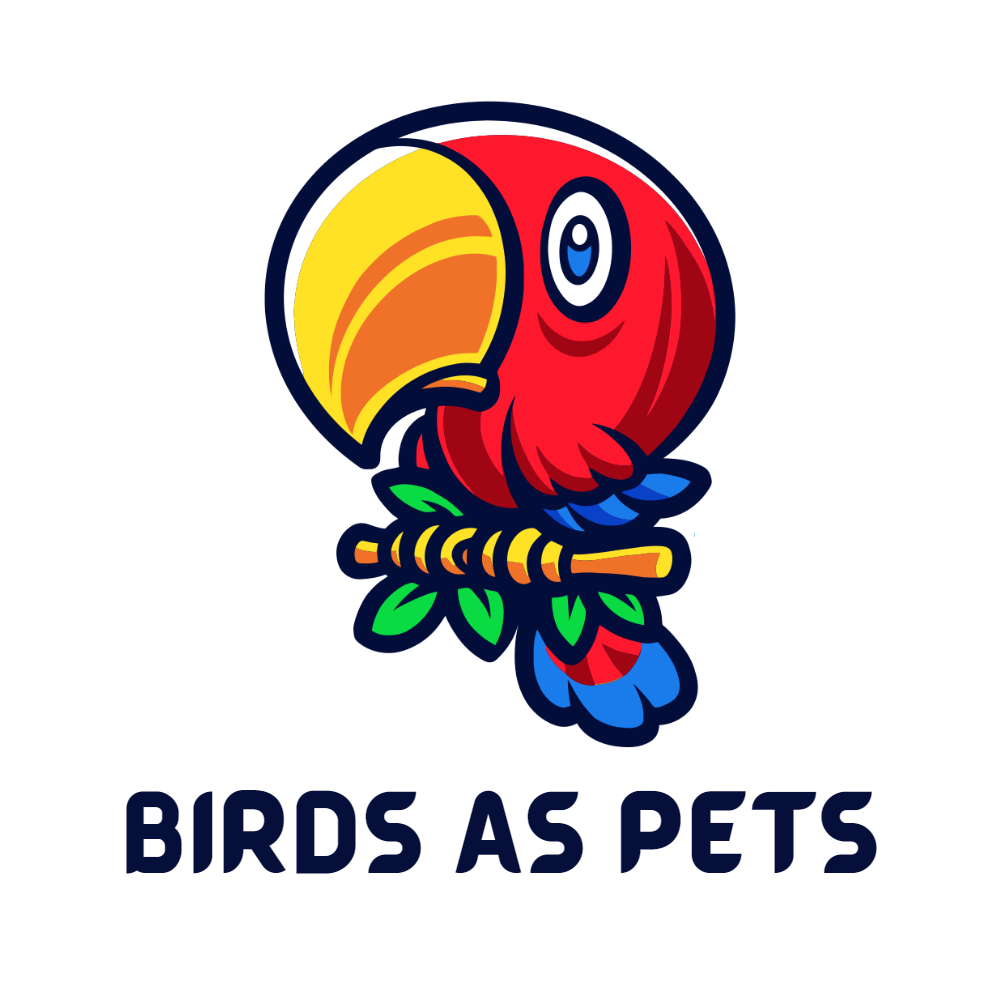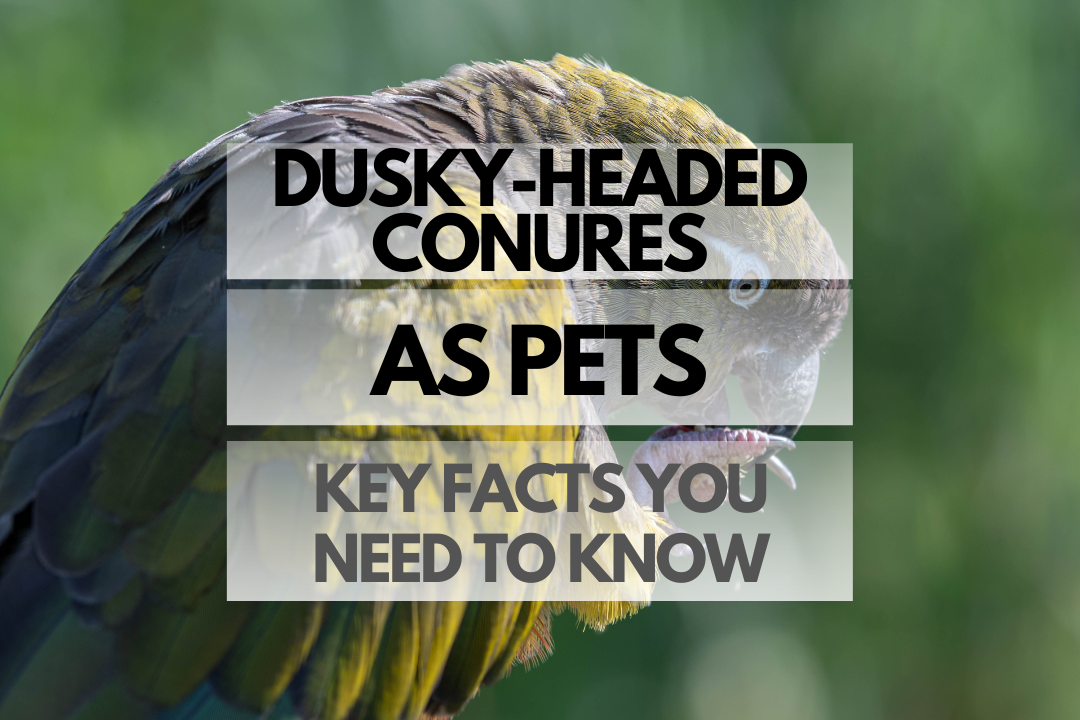If you’re considering a Dusky-headed Conure as a pet, you’re in for a treat! These intelligent, social, and playful birds make captivating companions. In this article, we’ll cover everything you need to know about Dusky-headed Conures, including their natural habitat, lifespan, care requirements, and more.
Quick Reference Table: Dusky-headed Conure Facts
| Fact | Details |
|---|---|
| Scientific Name | Aratinga weddellii |
| Size | 10-12 inches (25-30 cm) |
| Weight | 3.5-4.5 ounces (100-130 grams) |
| Average Lifespan | 20-25 years |
| Temperament | Social, playful, intelligent |
| Talking Ability | Moderate |
| Colors | Green, gray, and blue |
Where Do Wild Dusky-headed Conures Live?
Wild Dusky-headed Conures are native to South America, where they inhabit the Amazon Basin. They are typically found in rainforests, savannas, and palm swamps. These social birds live in large flocks and are known for their acrobatic displays and loud vocalizations.
Dusky-headed Conure Lifespan: How Long Do They Live as Pets?
Dusky-headed Conures have an average lifespan of 20-25 years in captivity when provided with proper care and nutrition. As a long-lived pet, owning a Dusky-headed Conure requires a significant time commitment, and it’s important to consider whether you’re prepared to care for your bird for its entire life before bringing one into your home.
Are Dusky-headed Conures Good Pets?
Dusky-headed Conures make excellent pets for the right person or family. They are known for their playful and affectionate nature, as well as their intelligence and curiosity. These birds form strong bonds with their owners and enjoy interacting with them regularly. Their moderate talking ability and charming personalities make them a popular choice among bird enthusiasts.
Are Dusky-headed Conures as Pets Good for Beginners?
Dusky-headed Conures can be suitable for beginners, as they are relatively easy to care for and have a friendly disposition. However, it’s essential to understand and be prepared for the commitment of owning a parrot, including the time, money, and attention required to keep your bird happy and healthy.
Are Dusky-headed Conures Easy to Care For?
While no pet bird is truly “easy” to care for, Dusky-headed Conures have relatively straightforward care requirements compared to some other parrot species. They need a balanced diet, appropriate housing, regular interaction, and mental stimulation to thrive. With proper care, these birds can be a joy to have as part of your family.
Dusky-headed Conure Pros and Cons
| Pros | Cons |
|---|---|
| Affectionate and social | Can be noisy at times |
| Intelligent and playful | Require a significant time commitment |
| Moderate talking ability | Potential for destructive behavior if not provided with enough stimulation |
| Relatively easy to care for | Can be prone to certain health issues |
Dusky-headed Conure Price and Costs
The price of a Dusky-headed Conure can range from $200 to $600, depending on factors such as age, health, and breeder reputation. Initial setup costsfor a cage, toys, perches, and other supplies can range from $300 to $500. Ongoing expenses include food, veterinary care, and replacement toys, which can add up to around $50 to $100 per month.
Where to Buy Dusky-headed Conures
It’s essential to purchase your Dusky-headed Conure from a reputable breeder or rescue organization. Reputable breeders will ensure your bird is healthy and well-socialized, while rescues offer the opportunity to provide a loving home to a bird in need. Be sure to do your research and ask for recommendations from bird clubs, veterinarians, or other bird owners to find a reliable source for your new pet.
Caring for Dusky-headed Conures
Dusky-headed Conure Food
A balanced diet is crucial for your Dusky-headed Conure’s health. A high-quality pelleted diet should make up the majority of their food, supplemented with a variety of fresh fruits and vegetables. Occasional treats like nuts and seeds can be given in moderation. It’s important to avoid foods that are toxic to birds, such as avocado, chocolate, and onions.
Health and Common Issues
While Dusky-headed Conures are generally healthy birds, they can be prone to certain issues, including feather plucking, obesity, and respiratory infections. Regular veterinary check-ups and a proper diet can help prevent many of these problems.
Signs of Healthy Dusky-headed Conure
| Healthy Dusky-headed Conure | Sick Dusky-headed Conure |
|---|---|
| Bright, clear eyes | Discharge or redness around the eyes |
| Smooth, well-groomed feathers | Ruffled, plucked, or dull feathers |
| Active and alert | Lethargic or unresponsive |
| Normal droppings | Discolored, watery, or abnormal droppings |
| Maintaining a healthy weight | Significant weight loss or gain |
If you notice any signs of illness in your Dusky-headed Conure, it’s crucial to consult with an avian veterinarian as soon as possible to address the issue and ensure your bird’s long-term health.
Dusky-headed Conures Pet Insurance
Investing in pet insurance for your Dusky-headed Conure can be a wise decision, as it can help cover unexpected veterinary expenses in the case of illness or injury. Several pet insurance providers offer coverage for exotic pets like parrots, so it’s essential to research and compare policies to find the best fit for your bird’s needs and your budget.
Personality and Behavior
Dusky-headed Conures are known for their playful, affectionate, and intelligent personalities. These birds love to interact with their owners, learning new tricks, and exploring their surroundings. They can be quite inquisitive and may get into mischief if not provided with enough mental stimulation. Overall, their charming personalities make them a delightful addition to any household.
Are Dusky-headed Conures Social?
Yes, Dusky-headed Conures are highly social creatures. In the wild, they live in large flocks, and as pets, they form strong bonds with their human family members. These birds thrive on social interaction and require regular attention and playtime to stay happy and healthy. It’s crucial to provide them with plenty of socialization to prevent feelings of loneliness or boredom.
Speech and Noise of Dusky-headed Conures
Dusky-headed Conures have moderate talking abilities and can learn to mimic several words and phrases. They are not as skilled at talking as some larger parrot species but can still be quite entertaining and engaging. It’s essential to be prepared for noise, as these birds are known for their loud vocalizations, especially when calling to one another or expressing excitement.
Similar Species to Dusky-headed Conures
There are several parrot species similar to Dusky-headed Conures, including:
- Sun Conures
- Green-cheeked Conures
- Jenday Conures
- Nanday Conures
These species share some similarities in size, appearance, and temperament, but each has its unique traits and care requirements. It’s essential to research and consider the specific needs of each species before deciding which one is best for your home and lifestyle.
Can Dusky-headed Conures Live With Other Pets and Birds?
Dusky-headed Conures can often coexist peacefully with other bird species, as long as they are of similar size and temperament. However, it’s essential to monitor their interactions closely, especially during the initial introduction period, to prevent any aggression or territorial behavior. It’s also crucial to ensure that any other pets in the home, such as dogs or cats, are well-socialized with birds and supervised during interactions to prevent accidents.
Are Dusky-headed Conures Legal to Have as Pets?
In most locations, Dusky-headed Conures are legal to own as pets. However, regulations can vary by state or country, so it’s essential to check your local laws and obtain any necessary permits before bringing a Dusky-headed Conure into your home.
Additional Resources
For more information on Dusky-headed Conures, consider the following resources:
- Books: “The Conure Handbook” by Anne C. Watkins
- Forums: Avian Avenue Parrot Forum
- Facebook Groups: Conure Owners & Lovers
- Scientific Articles: “The Biology of the Dusky-headed Parakeet (Aratinga weddellii) in Amazonian Northeastern Peru” by Michael A. Patten and John C. Wingfield
FAQ for Dusky-headed Conures as Pets
Do Dusky-headed Conures talk?
Yes, Dusky-headed Conures have moderate talking abilities and can learn to mimic several words and phrases. However, their talking skills are not as advanced as some larger parrot species.
Are Dusky-headed Conures suitable for families with young kids?
Dusky-headed Conures can be suitable for families with young children, as long as the children are taught how to interact with the bird respectfully and gently. It’s essential to supervise interactions between young kids and the bird to ensure everyone’s safety.
Can Dusky-headed Conures be trained?
Yes, Dusky-headed Conures are intelligent and can betrained to perform various tricks, such as stepping up onto your finger, waving, and hanging upside down. Consistent, positive reinforcement training is the key to success.
How do I know what gender Dusky-headed Conures are?
It can be challenging to determine the gender of a Dusky-headed Conure visually, as males and females have similar appearances. The most reliable method for determining gender is through DNA testing, which can be done using a blood sample or a feather sample.
What is the lifespan of a Dusky-headed Conure?
With proper care, a Dusky-headed Conure can live for 20-30 years or more. Providing a nutritious diet, a clean and safe living environment, and regular veterinary care can help ensure a long, healthy life for your bird.
What do Dusky-headed Conures eat?
Dusky-headed Conures require a balanced diet that includes a high-quality pellet mix, fresh fruit, vegetables, and occasional treats like nuts and seeds. It’s essential to avoid feeding them foods high in fat, salt, or sugar, as well as any toxic foods like avocado, chocolate, or onions.

